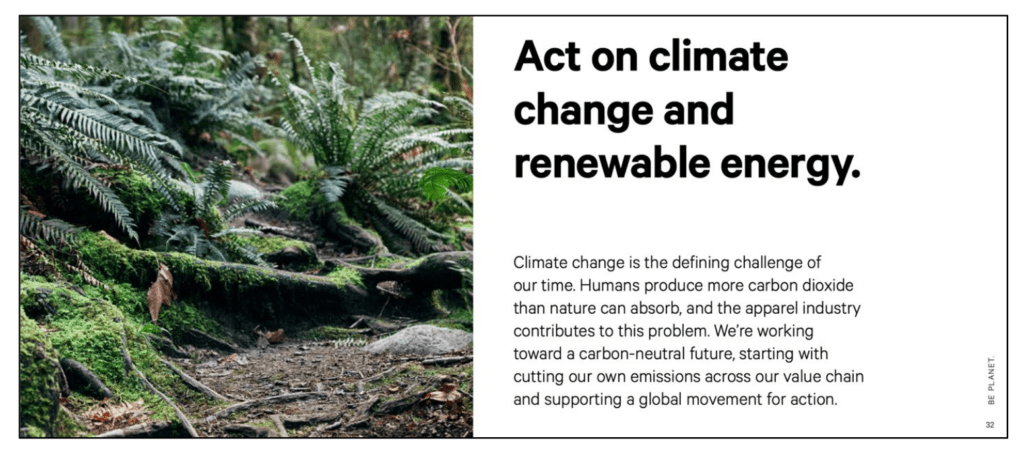Lululemon has been named in a new lawsuit for allegedly deceiving consumers by way of misleading statements over its commitment to the environment, marking the latest in a string of “greenwashing” lawsuits being waged against companies over the veracity of their sustainability claims. In the proposed class action complaint that she filed with the U.S. District Court for the Southern District of Florida on July 12, Amandeep Gyani alleges that while Lululemon presents itself as a “sustainable and environmentally friendly brand,” in reality, it has “taken advantage of consumers and their trust through a massive, global ‘greenwashing’ campaign.”
According to the newly-filed lawsuit, in an effort to attract eco-conscious consumers and “convince them to pay the exorbitant premiums that [it] charges for its products,” Lululemon rolled out its “Be Planet” campaign, through which it has duped consumers to believing that its “business practices, products, and actions are sustainable and have a positive impact on the environment.” Gyani asserts that she and thousands of other consumers have been “exposed to the deceptive and misleading messages in Lululemon’s marketing campaign” and that she believed that “Lululemon was an environmentally friendly company” when she purchased its products.
Lululemon “pursued its extensive Be Planet greenwashing marketing campaign through express and implied statements and images on its website, throughout its hundreds of retail stores, and elsewhere, which all build upon and perpetuate the message that the company’s actions and products are not only environmentally friendly, but that they provide at positive improvement of the environment and the restoration of a healthy planet,” per Gyani. The problem, she claims, is that Lululemon’s messaging is “unfair, false, deceptive, and misleading to reasonable consumers as they portray Lululemon as something it is not.”

> In particular, Gyani alleges that in furtherance of the “Be Planet” initiative, which Lululemon launched in 2020, the athleisure giant stated that 100 percent of its products will include sustainable materials and end-of use solutions by 2030; that at least 75 percent of its products will contain sustainable materials by 2025; it will offer guests new options to extend the life of its products by providing resell, repair, and/or recycle options by 2025; it will source 100 percent renewable electricity to power its operations by 2021; and it will reduce carbon emissions across its global supply chain by 60 percent per unit of value added, among other “commitments.”
“The apparel industry is a major contributor to the environmental crisis, and as one of the largest apparel companies in the world, Lululemon has a significant and growing climate and environmental footprint, and its actions and products directly cause harm to the environment and the deterioration of the planet’s health – the opposite of its Be Planet promises and representations,” Gyani argues.
As distinct from its commitments, she claims that an impact report released by Lululemon shows that “rather than reducing its greenhouse gas emissions,” the company’s emissions “have more than doubled” since it started its 2020 “Be Planet” campaign. At the same time, she takes issue with the company’s supply chain practices, its use of air travel for transporting freight, the amount of water it uses to make certain products, and its release of microplastics into the environment, which make it so that “instead of sustaining and positively improving the planet, Lululemon is increasingly causing negative impact and harm.”
As a result of Lululemon’s alleged misrepresentations and/or failure to disclose “material facts regarding the sustainability and environmental impact of [its] products and actions,” the company “sold more products and made more revenue than they otherwise would have” at the expense of herself and anyone else that “purchased any Lululemon branded product for personal use … in the U.S. since October 28, 2020,” Gyani asserts. Beyond that, she claims that because consumers purchased Lululemon’s products “over its competitors’ products due to the Be Planet campaign,” the campaign was “harmful to competition and unfairly took away market share from companies that did not engage in greenwashing practices.”
Against that background, Gyani accuses Lululemon of violating the Florida Deceptive and Unfair Trade Practices Act and engaging in misleading advertising and unjust enrichment. She is seeking monetary damages, as well as injunctive relief.

In a statement to TFL, a spokesperson for Lululemon said that it is “aware of the recent lawsuit” and that it is “confident the statements we make to the public accurately reflect our impact goals and commitments.” Be Planet is “not a marketing campaign,” the company said in its statement. “It is a pillar of our impact strategy, outlining the vision, goals and targets which guide our actions and investments. We are taking direct action and are committed to collaborating with industry partners to help address supply chain impacts on climate change. We welcome dialogue and remain focused on driving progress. This work is far from complete.”
THE BIGGER PICTURE: As consumers have become increasingly environmentally conscious, companies have rushed to market to them by touting – and sometimes, overstating – the environmental credentials of their wares and/or offerings, giving rise to regulatory attention and legal challenges in the process. The Federal Trade Commission, for instance, has been attuned to the potential for “greenwashing” since the 1990s when it began publishing its Guides for the Use of Environmental Marketing Claims. The “Green Guides,” which are currently in the process of being revised by the agency, aim to protect consumers from misleading green advertising and inform companies on how to avoid unlawful and deceptive advertising claims that “misrepresent, directly or by implication, that a product, package, or service offers a general environmental benefit.”
But how that regulatory awareness of the issue translates to successful litigation is a murkier question, as consumer plaintiffs continue to face an uphill battle in waging “greenwashing”-centric suits. In April, for example, Nike beat a proposed class action lawsuit accusing it of deceiving consumers by “greenwashing” thousands of its products. In that case, an U.S. Eastern District Court for Massachusetts court held that the plaintiff actually knew the company’s products are not made with “recycled and organic materials” when it tossed the case. Other big-name companies, including Allbirds, Canada Goose, and H&M, have faced similar lawsuits over their sustainability practices, with such suits either being dismissed by the court or dropped by plaintiffs.
It is not all bad news for plaintiffs – in April, a proposed class action lodged against Coca-Cola over its recycling practices was permitted to proceed after being dismissed and refiled twice in a California federal court. In its decision, the court highlighted the thin line between the specific and ambiguous advertising statements that companies are allowed to make when it comes to their sustainability claims. “The problem for [Coca-Cola] is that the Green Guides allow ‘unqualified’ recycling claims under certain circumstances, but [its] statements expressly qualify recyclability as ‘100%,’” U.S. District Court Judge James Donato wrote in his ruling, allowing the case against Coca-Cola to move forward. He went on to note that under federal regulations, marketing claims may not “overstate, directly or by implication, an environmental attribute or benefit.”
In terms of plaintiff/defendant success rate, it is a mixed bag. Advertising watchdog Truth in Advertising tracked more than 100 lawsuits accusing companies of “greenwashing” to provide a snapshot of the state of litigation related to the issue. In terms of the status of such suits between 2015 and 2023, 62 percent of the greenwashing class-action lawsuits were either settled and/or dismissed. “Of the 12 cases in which the terms of settlement agreements were disclosed, class members were awarded monetary relief in 11 cases and the company agreed to make changes to marketing materials in 9 cases,” the organization stated.
As for dismissals (at least some of these cases are ending in favor of the defendants) during the same time period,, federal courts have dismissed two cases regarding recyclable claims on various brands of bottled waters (Haggerty and Duchimaza); two cases regarding environmental claims made by clothing and apparel companies (Allbirds and H&M); two cases regarding carbon offset programs (Royal Dutch Airlines and Etsy); one case regarding reef-friendly claims on sunscreens; one case regarding environmental claims made by a grocery store, and one case regarding “Clean Diesel” claims.
The case is Gyani v. Lululemon Athletica Inc., 1:24-cv-22651 (S.D. Fla).













